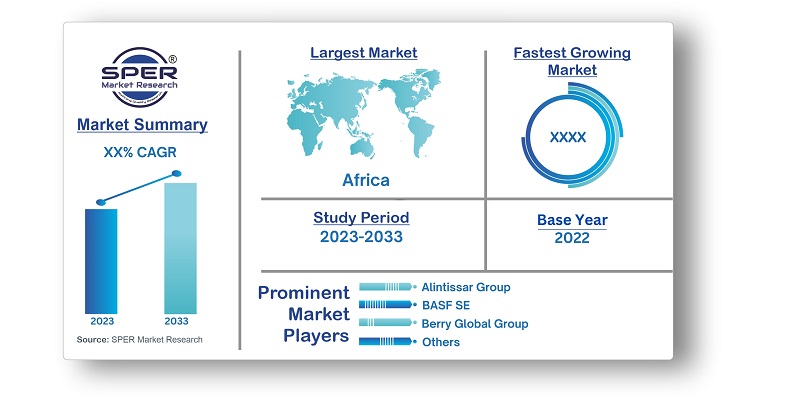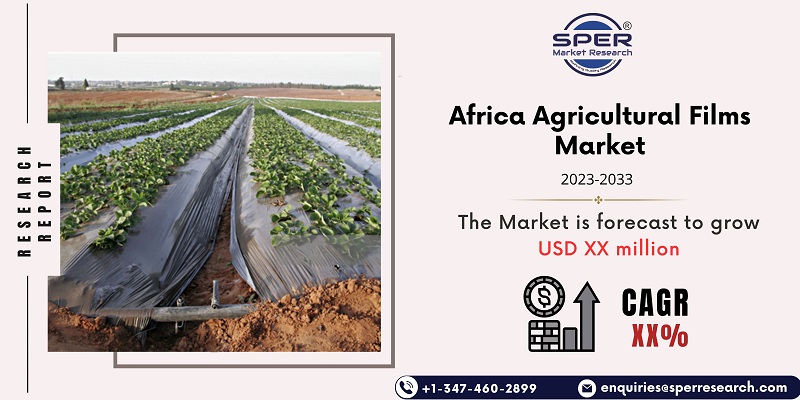
Africa Agricultural Films Market Growth, Size, Trends, Share, Revenue, Scope and Future Outlook
Africa Agricultural Films Market Size- By Type, By Application- Regional Outlook, Competitive Strategies and Segment Forecast to 2033
| Published: Dec-2023 | Report ID: AGRI2359 | Pages: 1 - 152 | Formats*: |
| Category : Agriculture | |||
- In July 2021: A new mantle film or net replacement film product from Trioworld compresses the bale prior to wrapping. PCR material is also used to create this novel product. These new items guaranteed a reduced environmental effect and opened up chances for greater circularity. This improved the company's standing in the international market, which includes Africa.
- In August 2019: Ecovio M 2351, a certified soil-biodegradable mulch film, was introduced by BASF SE. Ecovio mulch films can reduce water usage, improve weed management, and increase tomato yields by 15 to 50%. This assisted the business in growing its clientele in the area and raising the calibre of its products on the market.


| Report Metric | Details |
| Market size available for years | 2019-2033 |
| Base year considered | 2022 |
| Forecast period | 2023-2033 |
| Segments covered | By Type, By Application |
| Regions covered | Algeria, Egypt, Nigeria, South Africa, Others |
| Companies Covered | Alintissar Group, BASF SE, Berry Global Group, Inc., Exxon Mobil Corporation, Gundle Plastics Group, Industrial Development Company (INDEVCO), Polifilm GmbH, Rhino Plastics and Others |
- Agribusiness Professionals
- Environmentalists and Conservationists
- Equipment Manufacturers and Suppliers
- Farmers and Agricultural Producers
- General Public
- Students and Researchers:
- Others
| By Type: |
|
| By Application: |
|
| By Region: |
|
- Africa Agricultural Films Market Size (FY’2023-FY’2033)
- Overview of Africa Agricultural Films Market
- Segmentation of Africa Agricultural Films Market By Type (Ethyl Vinyl Acetate/Ethylene Butyl Acrylate, High-density Polyethylene, Linear Low-density Polyethylene, Low-density Polyethylene, Reclaims, Other Film Types)
- Segmentation of Africa Agricultural Films Market By Application (Greenhouse Film, Mulching Film, Silage Film)
- Statistical Snap of Africa Agricultural Films Market
- Expansion Analysis of Africa Agricultural Films Market
- Problems and Obstacles in Africa Agricultural Films Market
- Competitive Landscape in the Africa Agricultural Films Market
- Impact of COVID-19 and Demonetization on Africa Agricultural Films Market
- Details on Current Investment in Africa Agricultural Films Market
- Competitive Analysis of Africa Agricultural Films Market
- Prominent Players in the Africa Agricultural Films Market
- SWOT Analysis of Africa Agricultural Films Market
- Africa Agricultural Films Market Future Outlook and Projections (FY’2023-FY’2033)
- Recommendations from Analyst
1.1. Scope of the report1.2. Market segment analysis
2.1. Research data source2.1.1. Secondary Data2.1.2. Primary Data2.1.3. SPER’s internal database2.1.4. Premium insight from KOL’s2.2. Market size estimation2.2.1. Top-down and Bottom-up approach2.3. Data triangulation
4.1. Driver, Restraint, Opportunity and Challenges analysis4.1.1. Drivers4.1.2. Restraints4.1.3. Opportunities4.1.4. Challenges4.2. COVID-19 Impacts of the Africa Agricultural Films Market
5.1. SWOT Analysis5.1.1. Strengths5.1.2. Weaknesses5.1.3. Opportunities5.1.4. Threats5.2. PESTEL Analysis5.2.1. Political Landscape5.2.2. Economic Landscape5.2.3. Social Landscape5.2.4. Technological Landscape5.2.5. Environmental Landscape5.2.6. Legal Landscape5.3. PORTER’s Five Forces5.3.1. Bargaining power of suppliers5.3.2. Bargaining power of buyers5.3.3. Threat of Substitute5.3.4. Threat of new entrant5.3.5. Competitive rivalry5.4. Heat Map Analysis
6.1. Africa Agricultural Films Market Manufacturing Base Distribution, Sales Area, Product Type6.2. Mergers & Acquisitions, Partnerships, Product Launch, and Collaboration in Africa Agricultural Films Market
7.1. Africa Agricultural Films Market Value Share and Forecast, By Type, 2023-20337.2. Ethyl Vinyl Acetate (EVA)/Ethylene Butyl Acrylate (EBA)7.3. High-density Polyethylene7.4. Linear Low-density Polyethylene7.5. Low-density Polyethylene7.6. Reclaims7.7. Other Film Types
8.1. Africa Agricultural Films Market Value Share and Forecast, By Application, 2023-20338.2. Greenhouse Film8.3. Mulching Film8.4. Silage Film
9.1. Africa Agricultural Films Market Size and Market Share
10.1. Africa Agricultural Films Market Size and Market Share By Type (2019-2026)10.2. Africa Agricultural Films Market Size and Market Share By Type (2027-2033)
11.1. Africa Agricultural Films Market Size and Market Share By Application (2019-2026)11.2. Africa Agricultural Films Market Size and Market Share By Application (2027-2033)
12.1. Africa Agricultural Films Market Size and Market Share By Region (2019-2026)12.2. Africa Agricultural Films Market Size and Market Share By Region (2027-2033)12.3. Algeria12.4. Egypt12.5. Nigeria12.6. South Africa12.7. Others
13.1. Alintissar Group13.1.1. Company details13.1.2. Financial outlook13.1.3. Product summary13.1.4. Recent developments13.2. BASF SE13.2.1. Company details13.2.2. Financial outlook13.2.3. Product summary13.2.4. Recent developments13.3. Berry Global Group, Inc.13.3.1. Company details13.3.2. Financial outlook13.3.3. Product summary13.3.4. Recent developments13.4. Exxon Mobil Corporation13.4.1. Company details13.4.2. Financial outlook13.4.3. Product summary13.4.4. Recent developments13.5. Gundle Plastics Group13.5.1. Company details13.5.2. Financial outlook13.5.3. Product summary13.5.4. Recent developments13.6. Industrial Development Company (INDEVCO)13.6.1. Company details13.6.2. Financial outlook13.6.3. Product summary13.6.4. Recent developments13.7. Polifilm GmbH13.7.1. Company details13.7.2. Financial outlook13.7.3. Product summary13.7.4. Recent developments13.8. Rhino Plastics13.8.1. Company details13.8.2. Financial outlook13.8.3. Product summary13.8.4. Recent developments13.9. Others
SPER Market Research’s methodology uses great emphasis on primary research to ensure that the market intelligence insights are up to date, reliable and accurate. Primary interviews are done with players involved in each phase of a supply chain to analyze the market forecasting. The secondary research method is used to help you fully understand how the future markets and the spending patterns look likes.
The report is based on in-depth qualitative and quantitative analysis of the Product Market. The quantitative analysis involves the application of various projection and sampling techniques. The qualitative analysis involves primary interviews, surveys, and vendor briefings. The data gathered as a result of these processes are validated through experts opinion. Our research methodology entails an ideal mixture of primary and secondary initiatives.



Frequently Asked Questions About This Report
PLACE AN ORDER
Year End Discount
Sample Report
Pre-Purchase Inquiry
NEED CUSTOMIZATION?
Request CustomizationCALL OR EMAIL US
100% Secure Payment






Related Reports
Our Global Clients
Our data-driven insights have influenced the strategy of 200+ reputed companies across the globe.




















